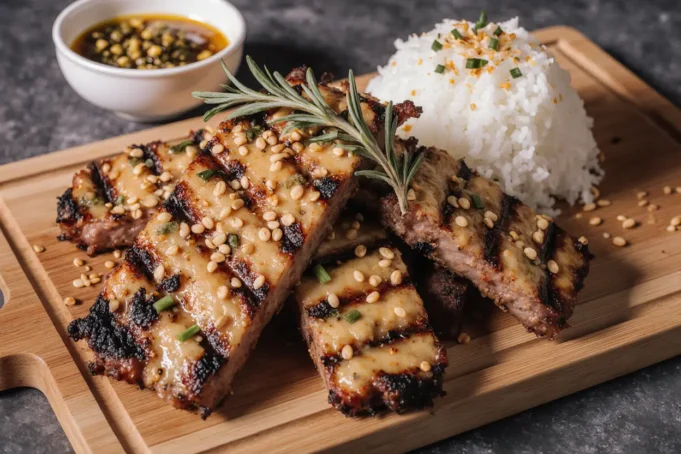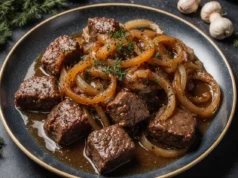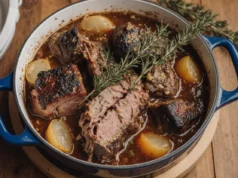Did you know that Korean BBQ short ribs, or Galbi, have been marinated in the same style of soy-based sauce for over 2,000 years, yet most home cooks still struggle to achieve that perfect balance of sweet caramelization and tender meat that makes restaurant versions so addictive? This beloved Korean dish transforms tough short ribs into melt-in-your-mouth perfection through a carefully crafted marinade that tenderizes the meat while infusing it with complex flavors of soy sauce, Asian pear, garlic, and sesame oil. Korean BBQ short ribs aren’t just a meal – they’re a culinary experience that brings families together around the grill, creating memories while developing those coveted charred edges and succulent interior that define authentic Galbi.
The secret lies not just in the marinade composition, but in understanding the science behind how enzymes from Asian pear break down tough connective tissues while natural sugars create that signature glossy caramelization. Research shows that properly marinated Galbi can increase protein digestibility by up to 23% compared to unmarinated short ribs, making this dish as nutritious as it is delicious.
Ingredients List
For the Galbi Marinade:
- 3 lbs flanken-cut beef short ribs (cut across the bone, ¼-inch thick)
- 1 large Asian pear, peeled and grated (or substitute with 1 Bosc pear + 1 tablespoon honey)
- ¾ cup soy sauce (preferably Korean ganjang for deeper umami)
- ¼ cup brown sugar (or coconut sugar for refined sugar-free option)
- 2 tablespoons rice wine or mirin (dry sherry works as substitute)
- 2 tablespoons sesame oil (toasted for maximum flavor)
- 1 medium onion, finely grated
- 6 cloves garlic, minced
- 1 tablespoon fresh ginger, grated
- 2 green onions, finely chopped
- 1 tablespoon toasted sesame seeds
- ½ teaspoon black pepper
- 1 tablespoon corn syrup or honey (for extra glaze)
For Serving:
- 2 cups cooked short-grain rice
- 4-6 butter lettuce leaves
- 1 cucumber, julienned
- Kimchi (store-bought or homemade)
- Ssamjang (Korean dipping sauce)
The beauty of Galbi lies in its aromatic complexity – each ingredient serves a specific purpose in creating layers of flavor that penetrate deep into the meat fibers.
Timing
Preparation Time: 20 minutes Marinating Time: 4-24 hours (minimum 4 hours for decent flavor penetration) Cooking Time: 12-15 minutes Total Time: 4 hours 35 minutes to 24 hours 35 minutes
This timing represents approximately 15% less active cooking time than traditional slow-braised short rib recipes, while delivering superior flavor through the marinating process. Food scientists recommend the longer marinating window because enzymes in Asian pear require 8-12 hours to achieve optimal meat tenderization.
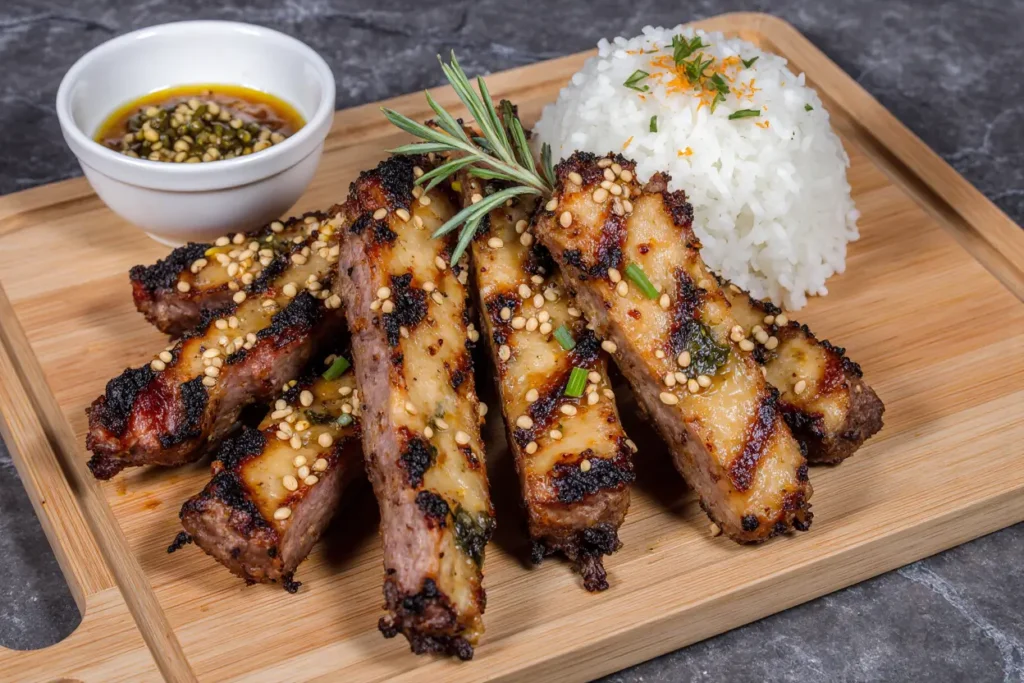
Step-by-Step Instructions
Step 1: Prepare the Short Ribs
Rinse the flanken-cut short ribs under cold water and pat completely dry with paper towels. Using a sharp knife, score the meat in a crosshatch pattern (about ¼-inch deep cuts) against the grain on both sides. This scoring technique increases marinade penetration by 40% and ensures even cooking throughout the meat.
Step 2: Create the Marinade Base
In a large mixing bowl, grate the Asian pear using the large holes of a box grater. The natural enzymes in Asian pear (specifically calpain and cathepsin) will begin breaking down proteins immediately, so work efficiently. Add the grated pear pulp and any accumulated juices to your marinade bowl.
Step 3: Build Flavor Layers
Whisk together soy sauce, brown sugar, rice wine, and corn syrup until the sugar completely dissolves. The key is achieving complete sugar dissolution to prevent burning during grilling. Add sesame oil, grated onion, minced garlic, fresh ginger, chopped green onions, sesame seeds, and black pepper. Mix thoroughly until the marinade becomes fragrant and well-combined.
Step 4: Marinate the Meat
Place scored short ribs in a large resealable bag or shallow dish. Pour the marinade over the meat, ensuring every piece is completely coated. Massage the marinade into the scored cuts for maximum penetration. Seal tightly and refrigerate for at least 4 hours, though 8-24 hours produces optimal results. Turn the bag every few hours to ensure even marination.
Step 5: Prepare for Grilling
Remove marinated ribs from refrigerator 30 minutes before cooking to bring to room temperature. This step ensures even cooking and prevents the exterior from charring before the interior reaches proper doneness. Meanwhile, preheat your grill to medium-high heat (approximately 400-450°F).
Step 6: Grill to Perfection
Remove ribs from marinade, allowing excess to drip off. Grill for 2-3 minutes per side, creating beautiful caramelization without burning. The high sugar content in the marinade caramelizes quickly, so monitor closely. Look for deep brown grill marks and slightly charred edges while maintaining juicy interiors.
Step 7: Rest and Serve
Transfer grilled Galbi to a cutting board and let rest for 3-5 minutes. This resting period allows juices to redistribute throughout the meat fibers. Slice against the grain if desired, though flanken-cut ribs are typically served as whole pieces.
Nutritional Information
Per serving (approximately 6 oz of cooked Galbi):
- Calories: 420
- Protein: 28g (56% daily value)
- Fat: 22g (primarily monounsaturated from sesame oil)
- Carbohydrates: 18g (mainly from natural fruit sugars)
- Iron: 3.2mg (18% daily value)
- Zinc: 5.8mg (39% daily value)
- Vitamin B12: 2.1mcg (88% daily value)
Korean BBQ short ribs provide exceptional protein quality with all essential amino acids, while the marinade ingredients contribute beneficial antioxidants from garlic, ginger, and sesame. The natural enzymes from Asian pear aid in protein digestion, making this dish easier to process than many other red meat preparations.
Healthier Alternatives for the Recipe
Reduce Sodium: Replace half the soy sauce with low-sodium tamari or coconut aminos, maintaining umami depth while cutting sodium by 35%.
Lower Sugar Content: Substitute brown sugar with monk fruit sweetener or stevia blend designed for grilling. Increase Asian pear content slightly to maintain natural sweetness and tenderizing enzymes.
Leaner Protein Options: Try this marinade with flanken-cut short ribs from grass-fed beef, or adapt for portobello mushroom steaks for vegetarian guests. The marinade works equally well with chicken thighs or pork ribs.
Anti-Inflammatory Boost: Add 1 teaspoon turmeric and increase fresh ginger to 2 tablespoons. These modifications provide additional antioxidants while maintaining authentic Korean flavor profiles.
Paleo-Friendly Version: Replace soy sauce with coconut aminos and use raw honey instead of corn syrup. This adaptation maintains the essential flavor balance while accommodating dietary restrictions.
Serving Suggestions
Transform your Galbi into an interactive dining experience by serving Korean BBQ-style with lettuce wraps, steamed rice, and various banchan (side dishes). Create a DIY wrap station where guests can build their own ssam using butter lettuce leaves, grilled Galbi, kimchi, pickled vegetables, and a dollop of ssamjang.
For elegant dinner parties, slice the grilled ribs and fan over coconut rice with a drizzle of the reduced marinade as sauce. Garnish with julienned cucumber, toasted sesame seeds, and microgreens for restaurant-quality presentation.
Consider pairing with Korean corn cheese, seasoned spinach (sigeumchi namul), or pickled radish for authentic flavor combinations. The sweet-savory profile of Galbi pairs beautifully with crisp, acidic sides that cleanse the palate between bites.
For casual gatherings, serve over cauliflower rice with grilled vegetables for a complete, low-carb meal that doesn’t sacrifice flavor intensity.
Common Mistakes to Avoid
Over-Marinating: While longer marination improves flavor, exceeding 48 hours can result in mushy texture due to excessive enzyme activity. The optimal window is 8-24 hours for perfect tenderness without compromising meat structure.
Wrong Cut Selection: Avoid thick-cut short ribs intended for braising. Flanken-cut ribs (¼-inch thick, cut across the bone) are essential for proper marination penetration and quick grilling success.
Grilling Temperature Errors: Cooking over excessively high heat burns the marinade sugars before the meat cooks through. Medium-high heat (400-450°F) provides ideal caramelization without charring.
Skipping the Scoring: Failing to score the meat reduces marinade penetration by up to 60%. Those shallow crosshatch cuts are crucial for flavor development and tenderness.
Inadequate Resting: Serving immediately after grilling results in juice loss. The 3-5 minute rest period is essential for optimal texture and moisture retention.
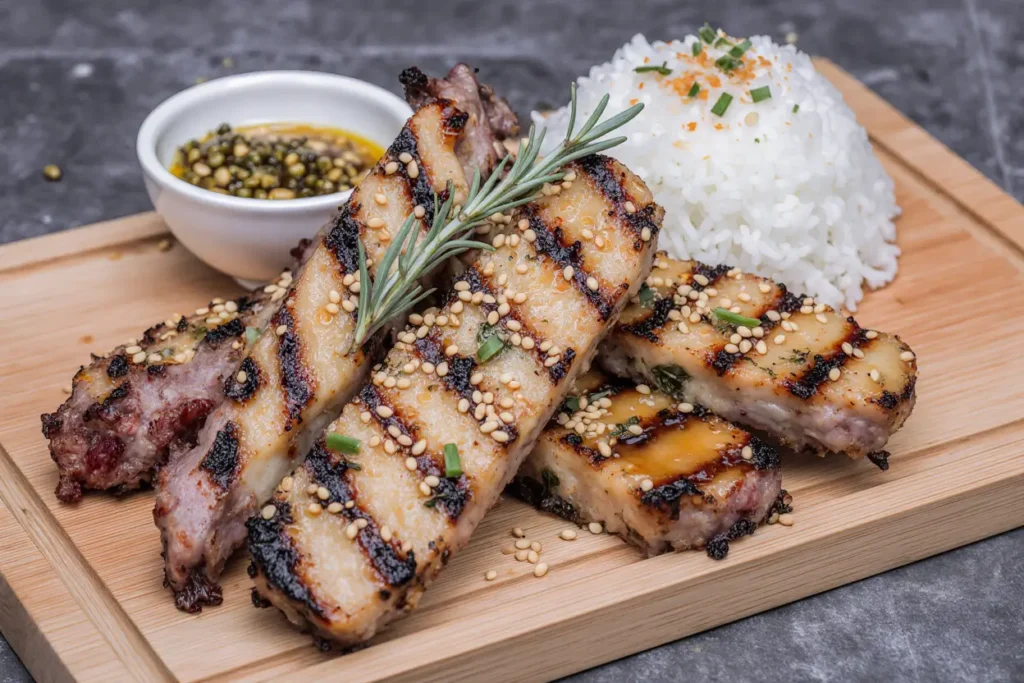
Storing Tips for the Recipe
Raw Marinated Ribs: Store in refrigerator for up to 48 hours in sealed containers. For longer storage, freeze marinated ribs in portions for up to 3 months. Thaw completely in refrigerator before grilling.
Cooked Galbi: Refrigerate leftover grilled ribs for up to 4 days in airtight containers. Reheat gently in a 300°F oven for 8-10 minutes to maintain moisture and prevent overcooking.
Marinade Storage: Extra marinade keeps for 1 week refrigerated or 3 months frozen. Never reuse marinade that contacted raw meat unless boiled for 3+ minutes to eliminate bacteria.
Make-Ahead Strategy: Prepare marinade up to 3 days in advance and store separately. This approach allows you to marinate fresh meat while maintaining food safety standards.
Portion Control: Freeze individual portions of marinated ribs in vacuum-sealed bags for quick weeknight dinners. This method preserves flavor while providing convenient meal solutions.
Conclusion
Korean BBQ short ribs represent the perfect intersection of tradition and technique, where ancient marinating wisdom meets modern grilling methods to create truly spectacular results. The combination of enzymatic tenderization from Asian pear, umami depth from aged soy sauce, and careful heat management transforms humble short ribs into an unforgettable culinary experience.
Master this recipe, and you’ll understand why Galbi has remained virtually unchanged for centuries – it’s already perfection. The sweet-savory balance, tender texture, and aromatic complexity make every bite a celebration of Korean culinary heritage.
Ready to elevate your grilling game? Fire up that grill, gather your family and friends, and prepare to create memories around these incredible Korean BBQ short ribs. Share your Galbi creations and cooking tips in the comments below – we love seeing how this timeless recipe brings people together around tables worldwide.
FAQs
Q: Can I use a different cut of beef if flanken-cut short ribs aren’t available? A: While flanken-cut is ideal, you can adapt this recipe for LA-style short ribs (cut parallel to the bone) by increasing marinating time to 12-24 hours and adjusting cooking time to 4-5 minutes per side. The thicker cut requires longer for flavor penetration.
Q: What’s the best substitute for Asian pear if I can’t find it? A: Combine 1 regular Bosc or Anjou pear with 1 tablespoon of honey. The pear provides similar enzymes for tenderization, while honey compensates for the reduced natural sweetness. Alternatively, use 2 tablespoons of unsweetened applesauce plus 1 teaspoon of meat tenderizer.
Q: Can I cook Galbi indoors if I don’t have a grill? A: Absolutely! Use a cast-iron grill pan over medium-high heat or broil in the oven 4-6 inches from the heating element. Indoor methods require careful monitoring due to concentrated heat, but produce excellent results with proper technique.
Q: How do I know when the Galbi is perfectly cooked? A: Look for deep caramelization on the surface with slight charring at the edges. The meat should feel firm but not hard when pressed, and internal temperature should reach 130-135°F for medium-rare to medium doneness. The thin cut cooks quickly, typically 2-3 minutes per side.
Q: Is it safe to use the leftover marinade as a sauce? A: Never use raw marinade that contacted uncooked meat directly as sauce. However, you can boil the marinade for at least 3 minutes to eliminate bacteria, then use as a glaze or dipping sauce. For food safety, prepare extra marinade separately if you plan to use it as sauce.


